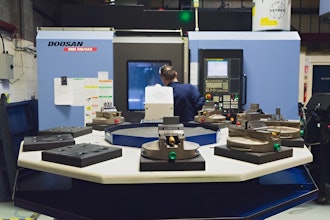Manufacturers are no stranger to technology and innovation, as their plants and distribution centers often feature incredible high-speed machinery, robotics and connected devices. But for many, building a comprehensive technology strategy to transform sales and marketing is an afterthought, and customer relationships are the first to suffer.
IDC predicts that this year 70 percent of manufacturers will be held back because of their outdated business models and technology. Companies that aren’t successful in adopting and optimizing new technologies run the risk of being left behind. Manufacturing executives realize this, as only 5 percent of manufacturing CIOs are satisfied with their current digital strategy. As a new generation of manufacturing workers begins to replace a retiring generation, a once skeptical industry is now looking to close the gap by adopting CRM technology to better manage customer relationships. For those who were the early adopters, CRM has served as a competitive advantage.
Put simply, a CRM system manages critical customer information in one place to help build and foster stronger relationships.
Here are seven reasons why manufacturers that may be struggling to embrace digital transformation and build better relationships with their customers should consider implementing a CRM system:
There's No Single Source for Information
Millions of manufacturing workers will be entering retirement in the next five years. For many companies, decades of customer and institutional business information will be leaving with them. If you store customer, order or distribution info in more than one location, such as spreadsheets or notes stuck to your computer, you're putting your team at a disadvantage. You lack a single view of every customer’s contact info, orders and interactions.
There's Little or No Visibility
Many manufacturers still rely on manual processes and disparate systems to manage their commercial business. Not only do they lack visibility into what customers want and need, they also lack insight into what salespeople or channel sales teams are doing. This makes it difficult to help them be successful — and keep them accountable. This lack of visibility extends to partners for manufacturers who go to market through dealers, distributors or resellers.
Sales and Marketing Teams are Misaligned
One of the most consistent issues we hear from manufacturing sales, channel sales and account managers is that they have little visibility or they do not understand the value of their marketing team's efforts. The sales and marketing relationship is so important and yet many companies struggle to get it right. Productivity takes a hit when there is misalignment.
Reports are Hard to Share
Generating reports and analytics on sales or channel team’s monthly progress against their quota would be ideal. But creating reports manually is cumbersome and error-prone, often resulting in no tracking at all. Whether you're pulling data out of multiple systems and dumping into a spreadsheet, or using limited reporting features in siloed systems then cobbling them together, its costing time and energy while introducing more opportunities for error.
You Aren't Taking Advantage of Mobile
Sales and channel reps spend much of their time out in the field, meeting prospects, customers and partners and discovering valuable info. But all this new data is often stored on handwritten notes or in files on personal computers, so sharing this information with account support teams and channels partners is often a challenge. Great meetings happen on the road, but if the sales or channel teams don’t always transfer their notes the important details get lost.
Breakdowns in Product Configuring, Pricing and Quoting Process
The end of the month or quarter causes a mad dash to close deals for many manufacturers, and an organization may have thousands of SKUs, bundles and service offerings. This complexity makes generating accurate quotes difficult often leaving money on the table. Multiple systems, manual processes and ineffective controls contribute to the problem.
Streamlining the process to one platform to configure products, control discounting, price orders approvals, and generate professional and accurate quotes can enable speed and accuracy.
Cross-sell, Up-sell, and Service Opportunities are Lost
You don’t target prospects based on their value to the business. Rather, you are sending the same types of offers and messages to customers, prospects, and channel partners in very different stages of the buying process, as well as in different industries or geographies.
A system for customer engagement enables collaboration between sales, service, and marketing improves sales, service opportunities while giving you visibility into more potential opportunities.
A successful manufacturing enterprise should focus on building a foundation of great customer relationships, with you, the seller, connecting with people who need your product or service. As your company expands, these connections become harder to manage. It’s not just a transaction between the buyer and seller, it’s an ongoing team effort with many stakeholders. Things can get out of hand fast unless you have a modern CRM system keeping everyone on the same page, generating insights, boosting productivity, and giving your team more time to build relationships. The right CRM is always the one that keeps you closest to your customers, no matter how much your business grows.
Cindy Bolt is SVP of Manufacturing at Salesforce.






















